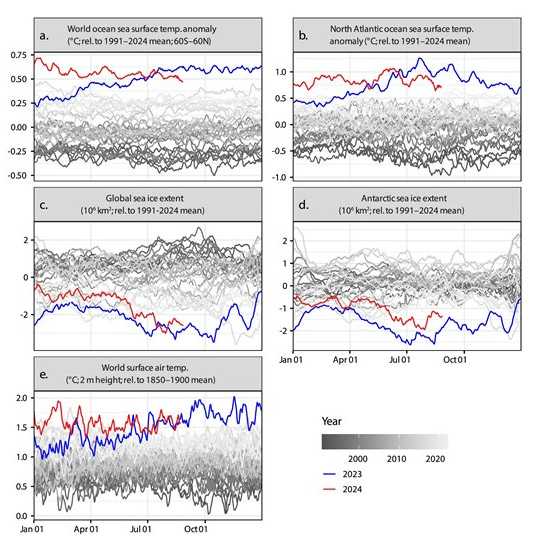Scientists have issued yet another clarion call regarding our seemingly unstoppable momentum toward climate catastrophe. In a recent article, The 2024 state of the climate report: Perilous times on planet Earth, some of the world’s leading climate scientists lay it out.
“We are on the brink of an irreversible climate disaster. This is a global emergency beyond any doubt. Much of the very fabric of life on Earth is imperiled. We are stepping into a critical and unpredictable new phase of the climate crisis . . . For half a century, global warming has been correctly predicted even before it was observed—and not only by independent academic scientists but also by fossil fuel companies.
“Despite these warnings, we are still moving in the wrong direction; fossil fuel emissions have increased to an all-time high, the 3 hottest days ever occurred in July of 2024, and current policies have us on track for approximately 2.7 degrees Celsius peak warming by 2100.
“Tragically, we are failing to avoid serious impacts, and we can now only hope to limit the extent of the damage. We are witnessing the grim reality of the forecasts as climate impacts escalate, bringing forth scenes of unprecedented disasters around the world and human and nonhuman suffering. We find ourselves amid an abrupt climate upheaval, a dire situation never before encountered in the annals of human existence. We have now brought the planet into climatic conditions never witnessed by us or our prehistoric relatives within our genus . . . “
Just how out of whack things are is depicted in one of the article’s graphics, which shows key climate metrics hitting levels way out of the historic record:

Credit: Ripple et al, 2024.
The scientists spell out the gory details, illustrating our global wrong way direction.
“Fossil fuel consumption rose by 1.5% in 2023 relative to 2022, mostly because of substantial increases in coal consumption (1.6%) and oil consumption (2.5%).”
“Global tree cover loss rose from 22.8 megahectares (Mha) per year in 2022 to 28.3 Mha per year in 2023, reaching its third-highest level; this was at least partly because of wildfires, which caused tree cover loss to reach a record high of 11.9 Mha.”
“Annual energy-related emissions increased 2.1% in 2023, and are now above 40 gigatons of carbon-dioxide-equivalent for the first time . . . the concentrations of carbon dioxide and methane are at record highs. . . Carbon dioxide levels were recently observed to be surging . . . Furthermore, the growth rate of methane emissions has been accelerating, which is very troubling . . . Nitrous oxide is also at a record high; annual anthropogenic emissions of this potent long-lived greenhouse gas have increased by roughly 40% from 1980 to 2020.”
“Surface temperature is at a record high, and 2024 is expected to be one of the hottest years ever recorded. Each 0.1°C of global warming places an extra 100 million people (or more) into unprecedented hot average temperatures.”
To the credit of this group, led by William Ripple of Oregon State University, they place the situation in the overall context of ecological overshoot.
“Global heating, although it is catastrophic, is merely one aspect of a profound polycrisis that includes environmental degradation, rising economic inequality, and biodiversity loss. Climate change is a glaring symptom of a deeper systemic issue: ecological overshoot, where human consumption outpaces the Earth’s ability to regenerate. Overshoot is an inherently unstable state that cannot persist indefinitely. As pressures increase and the risk of Earth’s climate system switching to a catastrophic state rises. more and more scientists have begun to research the possibility of societal collapse.”
“In a world with finite resources, unlimited growth is a perilous illusion. We need bold, transformative change: drastically reducing overconsumption and waste, especially by the affluent, stabilizing and gradually reducing the human population through empowering education and rights for girls and women, reforming food production systems to support more plant-based eating, and adopting an ecological and post-growth economics framework that ensures social justice.”
Will the world listen? Has it listened to decades of such clarion calls? A new United Nations report assesses climate plans of the world’s nations. UN Climate Change Executive Secretary Simon Stiell states,
”The report’s findings are stark but not surprising – current national climate plans fall miles short of what’s needed to stop global heating from crippling every economy, and wrecking billions of lives and livelihoods across every country.”
Even if all plans are fully implemented, a highly uncertain proposition, climate pollution would only be reduced 2.6% from 2019 levels by 2030, compared to the 43% needed to hold global heating below 1.5°C, a limit beyond which climate disruption sharply accelerates.
The world is clearly not getting it.
I will follow up with my reflections as a long-term climate activist and writer, stating what I think we can do, facing such a dire situation.





